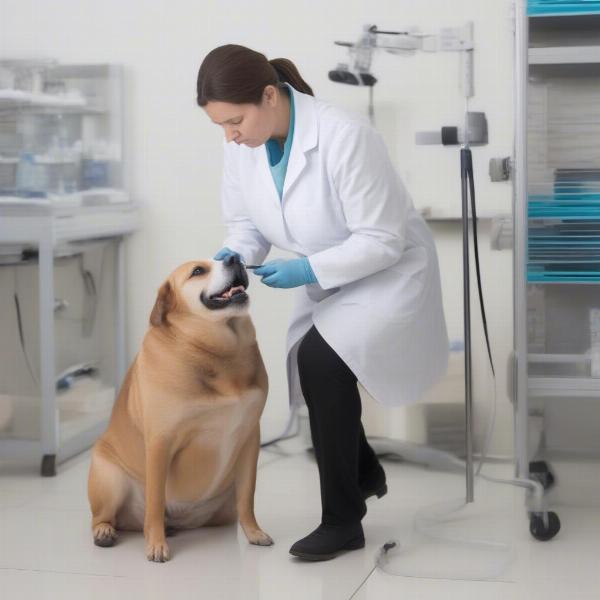A “fat dog 120” search likely indicates a concerned owner with a dog weighing around 120 pounds who appears overweight. This article will explore how to determine if your dog is truly obese, the health risks associated with it, and actionable steps to help your dog achieve a healthy weight. We’ll delve into diet, exercise, and lifestyle changes to support your furry friend’s journey to a healthier, happier life.
Is Your 120-Pound Dog Overweight?
While 120 pounds might be a healthy weight for some giant breeds, it could signal obesity in others. It’s crucial to assess your dog’s body condition, not just rely on the number on the scale. Feel for your dog’s ribs. If you can’t easily feel them beneath a layer of fat, your dog is likely overweight. A visual assessment is also helpful. Look at your dog from above and from the side. An overweight dog will have a noticeable lack of waist definition and a rounded abdomen. Consult your veterinarian for a professional evaluation and personalized guidance.
 Overweight Dog Assessment
Overweight Dog Assessment
Health Risks of Obesity in Dogs
Obesity in dogs, regardless of breed, can lead to a cascade of health issues. Joint problems, like arthritis, become more prevalent as extra weight strains joints and ligaments. Diabetes, heart disease, and respiratory problems also become more likely. Even seemingly less serious issues like decreased energy levels and difficulty regulating body temperature can significantly impact your dog’s quality of life.
Creating a Weight Loss Plan for Your Dog
Addressing canine obesity involves a multi-pronged approach. Diet, exercise, and lifestyle modifications all play a vital role.
Dietary Changes
Switching to a weight reduction dog food formulated to promote weight loss while providing essential nutrients is a good starting point. Portion control is paramount. Measure your dog’s food accurately to avoid overfeeding. Limit treats, or opt for lean treats for dogs.
Increasing Physical Activity
Tailor an exercise plan to your dog’s breed, age, and current fitness level. Start slowly and gradually increase the intensity and duration of walks. Incorporate playtime and activities your dog enjoys, such as fetching or swimming. Even short bursts of activity throughout the day can make a difference.
Lifestyle Adjustments
Small lifestyle changes can contribute to your dog’s weight loss journey. Regular vet check-ups are essential to monitor progress and address any underlying health conditions. Engage your dog in mentally stimulating activities to prevent boredom and overeating. Consistency and patience are key to achieving long-term success.
Supporting Your Dog’s Weight Loss
Remember, weight loss is a journey, not a race. Celebrate small victories and remain supportive. Don’t get discouraged by setbacks. Consistency and a positive approach will help your dog reach a healthy weight and enjoy a better quality of life.
Conclusion
Addressing a “fat dog 120” situation requires a comprehensive understanding of your dog’s individual needs. By implementing dietary changes, increasing physical activity, and making lifestyle adjustments, you can help your furry friend achieve a healthy weight and live a longer, happier life. Consult with your veterinarian for personalized guidance tailored to your dog’s specific circumstances.
FAQ
- How can I tell if my 120-pound dog is overweight? Feel for your dog’s ribs. If they are difficult to feel beneath a layer of fat, your dog is likely overweight. A visual assessment and consultation with your vet can confirm.
- What are the health risks of obesity in dogs? Obesity increases the risk of joint problems, diabetes, heart disease, respiratory issues, and decreased energy levels.
- What type of dog food should I feed my overweight dog? A dog food with glucosamine and chondroitin can help with joint health, which is often compromised in overweight dogs. Consider a weight reduction formula designed for weight loss.
- How much exercise does my overweight dog need? Start slowly and gradually increase the duration and intensity of exercise based on your dog’s breed, age, and current fitness level.
- What else can I do to help my dog lose weight? Portion control, limiting treats, regular vet check-ups, and mentally stimulating activities can support your dog’s weight loss efforts.
- How long will it take for my dog to lose weight? Weight loss is a gradual process. Be patient and consistent, and consult your vet for realistic expectations.
- What if my dog isn’t losing weight despite my efforts? Consult your veterinarian. There might be underlying health issues contributing to the weight problem.
Further Reading
Explore these related articles on ILM Dog for more information on supporting your dog’s health: cetyl m advanced dog joint action tablets 120ct.
ILM Dog is your trusted global resource for expert advice and practical tips on all aspects of dog care and nutrition. We offer guidance on breed selection, health and medical care, training, nutrition, grooming, exercise, puppy care, senior dog care, travel, and products. Whether you’re a new dog owner or a seasoned expert, ILM Dog provides valuable information to help you nurture a healthy and happy canine companion. Contact us for personalized support: Email: [email protected], Phone: +44 20-3965-8624.